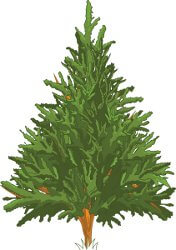http://www.really-learn-english.com/spelling-rules-magic-e.html
----------
The "magic" e comes at the end of a word that ends in a single vowel and a single consonant (for example: pine. There is a single vowel, i, before a single consonant, n, and then the "magic" e).
This e at the end is "magic" because it changes the vowel sound. In these words, the first vowel "says its name" (sounds like its name). And of course, the "magic" e changes the meaning of the word.
The "magic" e itself is completely silent.
For example, let's look at the word cap.

A cap
is a kind of hat that you wear on your head. This word is pronounced
with a short a
sound.
But what happens when we add the "magic" e at the end of the word? Well, the meaning of the word changes, and so does its pronunciation!
So, what is a cape?

A cape is a something superheroes wear on their backs! This word is pronounced with a long a sound because of the "magic" e at the end.
We say that the letter a "says its name" because it is pronounced just the way you would name the letter if you wanted to say its name in English.
Remember that the "magic" e is silent!
This rule applies with all five vowels in English: a, e, i, o, and u.
Here are some more examples with the vowel a:
All of the words in the first column have a short a sound, and all the words in the second column have a long a sound because of the "magic" e at the end.
Here are some examples with the vowel e:
There are not many examples with the vowel e, but the same rule is true here. The words in the first column have a short e sound, and the words in the second column have a long e sound.
Here are some examples with the vowel i:
The words in the first column have a short i sound, but the i "says its name" in the second column.

Here are some examples with the vowel o:
The words in the first column have a short o sound, but the o "says its name" in the second column. These words have a long o sound.
Finally, here are some examples with the vowel u:
The words in the first column have a short u sound, but the u "says its name" in the second column.
You can ask someone how many cubes of sugar they like in their tea.
But you can be sure they do not want any cubs, baby bears, in their tea!

There are a few common exceptions to this rule, like the words "have," "come," or "love." But in general, the rules discussed above will apply.
----------
The "magic" e comes at the end of a word that ends in a single vowel and a single consonant (for example: pine. There is a single vowel, i, before a single consonant, n, and then the "magic" e).
This e at the end is "magic" because it changes the vowel sound. In these words, the first vowel "says its name" (sounds like its name). And of course, the "magic" e changes the meaning of the word.
The "magic" e itself is completely silent.
For example, let's look at the word cap.

But what happens when we add the "magic" e at the end of the word? Well, the meaning of the word changes, and so does its pronunciation!
So, what is a cape?

A cape is a something superheroes wear on their backs! This word is pronounced with a long a sound because of the "magic" e at the end.
We say that the letter a "says its name" because it is pronounced just the way you would name the letter if you wanted to say its name in English.
Remember that the "magic" e is silent!
This rule applies with all five vowels in English: a, e, i, o, and u.
Here are some more examples with the vowel a:
| at | ate |
| mad | made |
| tap | tape |
| hat | hate |
All of the words in the first column have a short a sound, and all the words in the second column have a long a sound because of the "magic" e at the end.
Here are some examples with the vowel e:
| pet | Pete |
| met | mete |
There are not many examples with the vowel e, but the same rule is true here. The words in the first column have a short e sound, and the words in the second column have a long e sound.
Here are some examples with the vowel i:
| rid | ride |
| quit | quite |
| sit | site |
| pin | pine |
The words in the first column have a short i sound, but the i "says its name" in the second column.

Here are some examples with the vowel o:
| hop | hope |
| cop | cope |
| slop | slope |
| cod | code |
The words in the first column have a short o sound, but the o "says its name" in the second column. These words have a long o sound.
Finally, here are some examples with the vowel u:
| tub | tube |
| hug | huge |
| us | use |
| cub | cube |
The words in the first column have a short u sound, but the u "says its name" in the second column.
You can ask someone how many cubes of sugar they like in their tea.
But you can be sure they do not want any cubs, baby bears, in their tea!

There are a few common exceptions to this rule, like the words "have," "come," or "love." But in general, the rules discussed above will apply.
Review
So, let's review what we have learned about the "magic" e in English:- The "magic" e
itself is completely silent.
- The "magic" e
comes at the end of words that end in a single vowel and a single
consonant.
- The "magic" e makes the single vowel before it "say its name."

